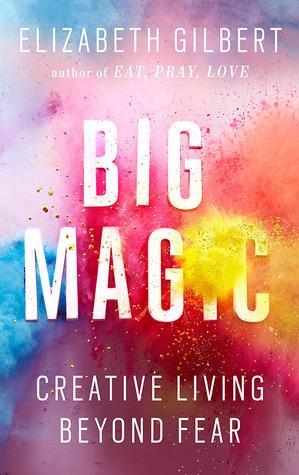 Big Magic: Creative Living Beyond Fear by Elizabeth Gilbert
Big Magic: Creative Living Beyond Fear by Elizabeth GilbertReading Big Magic by Elizabeth Gilbert is a great way to get my New Year off to creative start! Join me for a Read Along.
So far, we’ve discussed the first three parts of Big Magic:
- Part I, Courage
- Part II, Enchantment
- Part III, Permission
Share your thoughts on your blog and post it on the link list below, or on tomorrow’s list that’s about progress on the New Year’s Resolution Reading Challenge. Or, simply share your experience in the comments.
Part IV of Big Magic covers the role of persistence in creativity. This is an area that I’m feeling insecure about. I gave up on a project, several months ago, that I’d spent years developing, so I now fear that indicates an incurable lack of persistence on my part. Let’s see if Elizabeth Gilbert has the cure through some questions and answers about this section of the book.
One aspect of persistence that Gilbert covers is the need to accept the most difficult parts of any endeavor along with the fun parts. She quotes blogger Mark Manson who colorfully describes this concept as the “shit sandwich.” (I found his post, 7 Strange Questions That Help You Find Your Life Purpose, and it has a number of other helpful points, too). What are the disagreeable aspects of the creative work you want to do? Can you endure them? What strategies do you want to put in place to make them easier to handle?
I want to write for publication but I hate rejection. I want to write books but I hate that they take me years to complete, so long that I’ve lost interest in the topic long before I’ve typed, “The End.”
For the moment, my strategy is to focus on shorter pieces so I can get them done more quickly and I can practicing coping with rejection by sending them out faster. Actually, I’ll probably start with markets that I think are unlikely to reject me so that I can start with a bit of success and build from there. Fortunately, there’s a lot of help out there for writers dealing with rejection. I’m not alone in either the experience or the struggle with it.
Gilbert addresses perfection as an enemy to persistence in a chapter that is mostly directed at women. How has perfectionism impacted your creativity? If you’re not male, how has that played out in your experience? If you are male, are you aware of cultural differences around perfectionism that are related to gender?
This passage made me laugh out loud: “Now, I cannot imagine where women ever got the idea that they must be perfect in order to be loved or successful (Ha ha ha! Just kidding! I can totally image: We got it from every single message society has ever sent us! Thanks, all of human history!) ” (p. 169)
I laughed at the above passage and that’s how I know it effects me. Consciously, I’m barely aware of it. But I’ve done enough anti-racism work in recent years to know that just because I’m unaware of my cultural scripting, that doesn’t mean it isn’t having an enormous impact on my daily life.
I think I could spend two years in therapy to explore the question of perfectionism and how it stops my persistence in its tracks. I would end up with enough material for a book! But I don’t want to write a book on that topic, so instead, I’ll offer myself these strategies that work for me to combat perfectionism:
- Count words without judgment of quality. NaNoWriMo taught me this.
- Count hours not output. The Pomodoro Technique taught me this.
Those two techniques get me to work consistently and persistently. But, I still need something that gets me to done. Any suggestions?
Which quotes or anecdotes from Big Magic most motivated your desire to persist with your creativity?
Gilbert talks about how creative work can work as well or better than other things (including addictions) that take us out of ourselves for a while.
Perhaps creativity’s greatest mercy is this: By completely absorbing our attention for a short and magical spell, it can relieve us temporarily from the dreadful burden of being who we are. Best of all, at the end of your creative adventure you have a souvenir—something that you made, something to remind you forever of your brief but transformative encounter with inspiration. (p. 172)
I put post-it note on that page (the librarianly form of marginalia), that says: “souvenir” is a particularly apt metaphor for travel-writing.
“Done is better than good” is a saying of her mother’s. (p. 176) I’ve usually heard that (in scrapbooking and quilting circles) as “Done is better than perfect.” But I like this version even better. That phrase and the following passage may help me with my puzzle of how to get things to completion.
I also think my mother understood this radical notion—that mere completion is a rather honorable achievement in its own right. What’s more, it’s a rare one. Because the truth of the matter is, most people don’t finish things! Look around you, the evidence is everywhere: People don’t finish. They begin ambitious projects with the best of intentions, but then they get stuck in a mire of insecurity and doubt and hairsplitting…and they stop.
So if you can just complete something—merely complete it!—you’re already miles ahead of the pack, right there.
You may want your work to be perfect, in other words; I just want mine to be finished. (p. 177)
